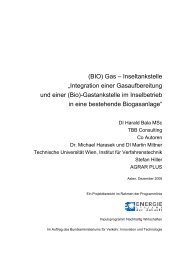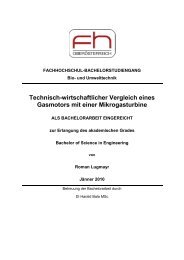JAHRESBERICHT [2007] - Wirtschaftskammer Österreich
JAHRESBERICHT [2007] - Wirtschaftskammer Österreich
JAHRESBERICHT [2007] - Wirtschaftskammer Österreich
Erfolgreiche ePaper selbst erstellen
Machen Sie aus Ihren PDF Publikationen ein blätterbares Flipbook mit unserer einzigartigen Google optimierten e-Paper Software.
4<br />
PREFACE<br />
In <strong>2007</strong>, the international petroleum market was again<br />
confronted with a global rise in prices for crude oil<br />
and products. Markets were quick to respond to news<br />
of riots, political calamities and the vagaries of the<br />
weather which might have an impact on the oil supply.<br />
Typical examples for <strong>2007</strong> were the continuing instability<br />
in the Near East, strikes in Nigeria, Venezuela’s<br />
nationalisation of its oil industry and the nuclear<br />
dispute with Iran. Prices for Brent crude rose by 63%<br />
over the year, to USD 96.02/bbl at the end of <strong>2007</strong>.<br />
At USD 97/bbl, the price had reached what was then<br />
an all-time high in the second half of November. With<br />
USD 72.7/bbl, the average price for Brent crude<br />
exceeded the peak of 2006 by 11.6%. Nevertheless, the<br />
outlook was different for the euro zone. While prices<br />
rose by more than 11%, the annual average on a euro<br />
basis remained almost unchanged at the previous<br />
year’s level, because the US dollar declined in value<br />
throughout <strong>2007</strong>, by an average of 9% below the 2006<br />
average. Thanks to the weakness of the US dollar,<br />
product prices in Rotterdam were only up to 7% above<br />
the 2006 level. For petrol pump prices in Austria the<br />
same would have been true if it had not been for a<br />
substantial increase in the mineral oil tax, especially<br />
on diesel fuel which was in brisk demand.<br />
According to data from the IAEA, global demand for<br />
crude oil grew by 1.1% in <strong>2007</strong>, to 85.8 mn bbl per day.<br />
The growth was fuelled mainly by additional demand<br />
from Asia and non-OECD countries, while OECD<br />
countries recorded a fall-off in their demand. Global<br />
crude production, at 85.6 mn bbl/day, was just like the<br />
rate of the previous year. When including NGL, OPEC<br />
had a market share of 43%. Austria recorded a decline<br />
in domestic consumption of petroleum products, from<br />
liquefied gas to fuels and bitumen, by 6% over 2006,<br />
to about 12 mn metric tons. In terms of global oil consumption,<br />
Austria thus consumed some 0.31% to 0.32%.<br />
Within the European Union, Austria similarly is a minor<br />
player at 1.7%, which does not have any effect on the<br />
international market structure. Rather, considering<br />
that Austria depends on oil imports for 93% of its consumption,<br />
it is obvious that our economy cannot be<br />
decoupled from the international oil market and its price<br />
trends. Nevertheless, the Austrian petroleum industry<br />
accepts its special responsibility for supplying the population<br />
and businesses of Austria with sufficient petroleum<br />
products. This responsibility includes not<br />
just obtaining crude oil from a wide range of countries<br />
and importing petroleum products through a number<br />
of different supply channels but also the stockkeeping<br />
of the stipulated emergency reserves to cover several<br />
months of demand.<br />
In this connection I would like to point out that the<br />
Austrian Petroleum Industry Association, in its capacity<br />
of representing its member companies, is charged with<br />
consulting in subjects of energy, environment, taxation,<br />
industrial code and social policy. Through its many<br />
working panels, the Association offers petroleum<br />
companies a platform within the scope of its statutory<br />
pressure group activities. Additionally, the Association<br />
has, in recent months, intensified its PR work to elucidate<br />
the industry’s viewpoint in the public discussion<br />
of fuel prices.<br />
The members of the Association, working to ensure<br />
the supply of energy to Austria as well as to Europe, are<br />
interested in an energy and environmental policy that<br />
does justice to the global challenges faced by energy<br />
suppliers in the future. It is of particular concern to<br />
the Association to identify realistic energy and environmental<br />
targets and frameworks to guide petroleum<br />
companies in the medium to long term. We therefore<br />
refute any excessive fast-tracking on the part of Austria<br />
in the shaping of laws and instead advocate a pan-<br />
European solution to achieve comprehensive supply<br />
security for petroleum products.<br />
Vienna, September 2008<br />
Wolfgang Ruttenstorfer, CEO<br />
President of the Austrian Petroleum Industry Association (APIA)


![JAHRESBERICHT [2007] - Wirtschaftskammer Österreich](https://img.yumpu.com/21345000/4/500x640/jahresbericht-2007-wirtschaftskammer-osterreich.jpg)
![JAHRESBERICHT [2007] - Wirtschaftskammer Österreich](https://img.yumpu.com/21344999/1/184x260/jahresbericht-2007-wirtschaftskammer-osterreich.jpg?quality=85)

